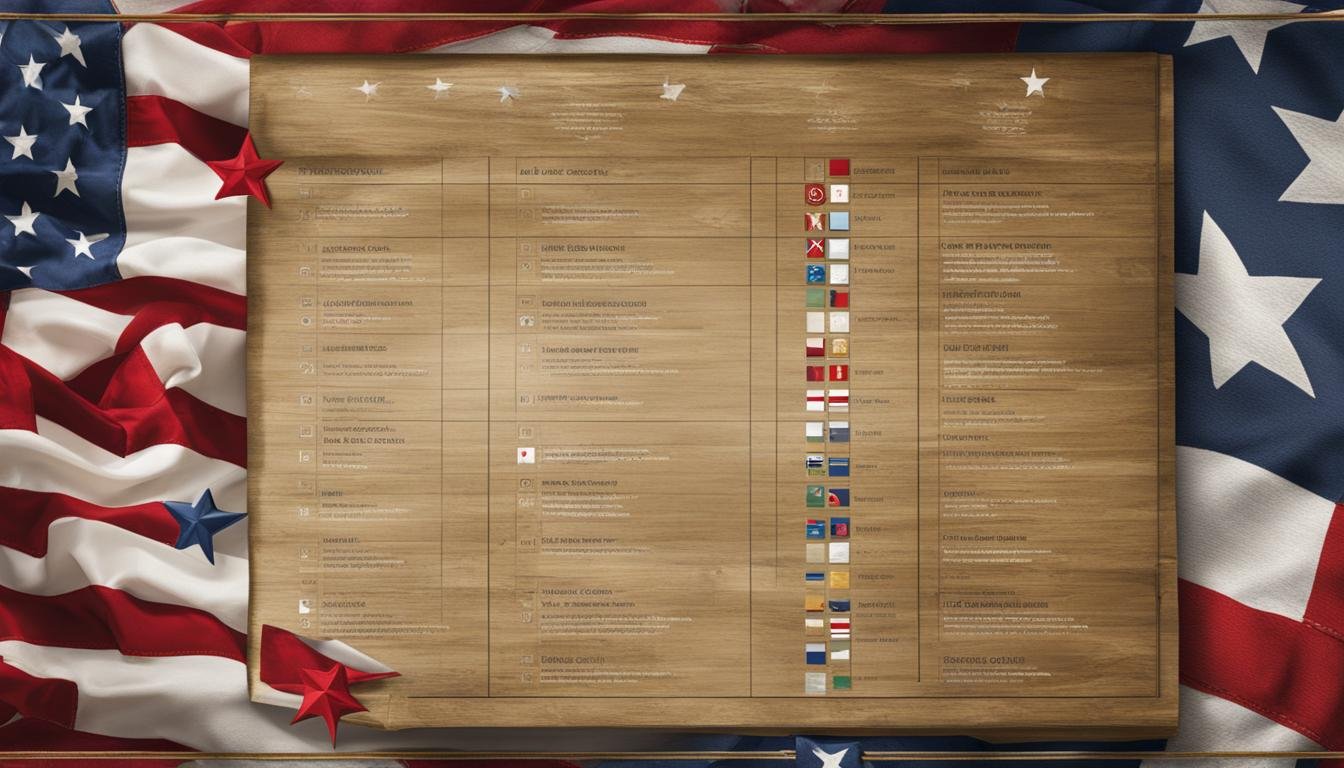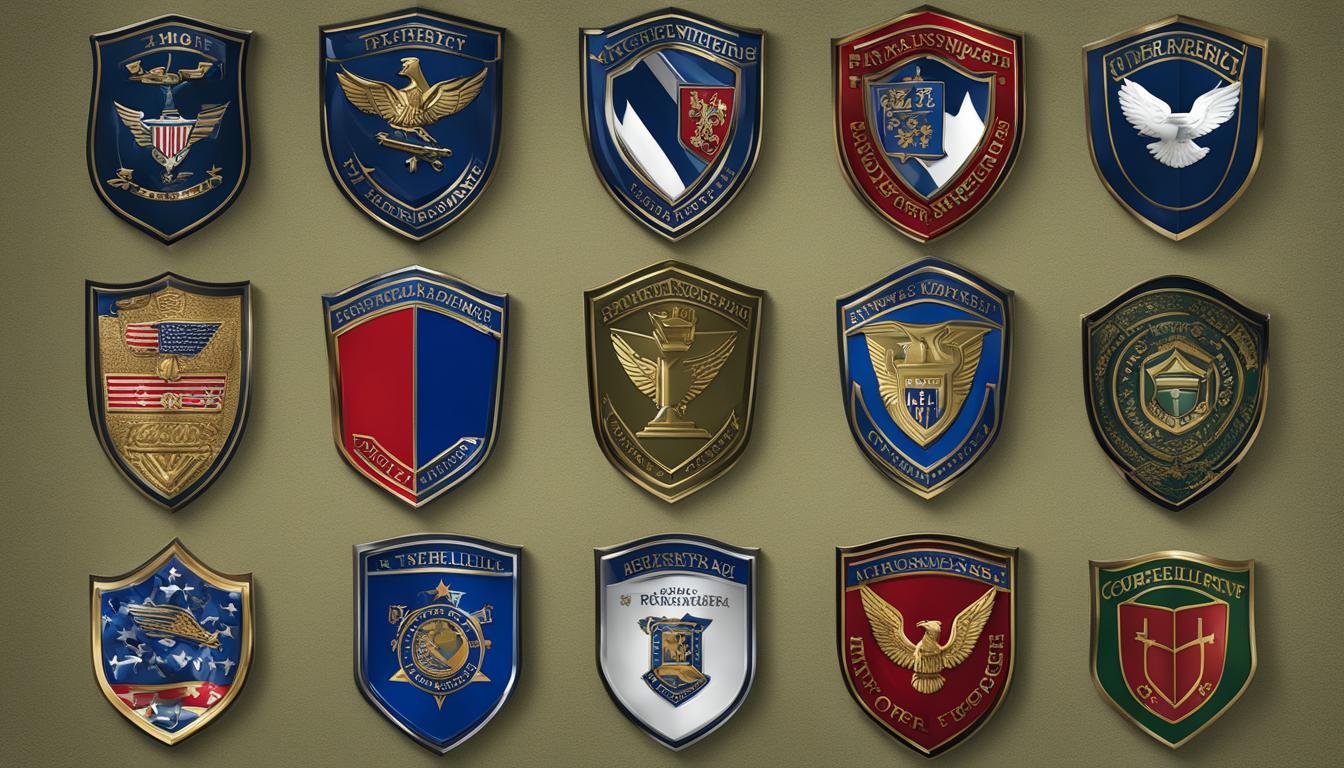Embarking on a new educational journey presents an opportunity for growth and advancement, especially for veterans ready to transition into the civilian world. Understanding how to find military-friendly colleges near you can mark the beginning of a prosperous chapter post-service. It requires diving into a list of top military-friendly colleges and universities and applying a detailed set of criteria for evaluating military-friendly colleges. The outcome? Gaining the myriad of benefits of attending a military-friendly college and positioning yourself for success as you integrate your rich military experience into an enriching academic pursuit.
Whether you are investigating nearby campuses or considering online options, pinpointing the right institution involves more than perusing a list. It’s about aligning a school’s offerings to your unique circumstances, necessitating a holistic approach to your selection process. From supportive veteran services and flexible learning formats to robust career development programs, your military-friendly college should be a springboard propelling you towards your educational and professional targets.
Let’s ensure your military service transitions into a powerful credential as you gear up to take on the world of academia and beyond. The mission starts now, soldier – let’s accelerate your path to academic valor and vocational victory.
How to Choose a Military-Friendly College for Veterans – Key Takeaways
- Evaluating a college’s veteran-friendly claim is essential; consider factors like academic flexibility, support services, and career alignment.
- Utilize resources to assemble a comprehensive list of top military-friendly colleges and universities that cater to your needs.
- Ensure the institutions offer real-world benefits, highlighting the benefits of attending a military-friendly college.
- Seek out programs and schools that acknowledge and give academic credit for your valuable military experience.
- Financial aid, including exclusive scholarships for veterans and dependents, should be among your primary criteria.
- Remember, the college you choose should not only be a good educational fit but also a stepping stone for your future career.
- Above all, the school’s community and culture should resonate with your identity as a veteran and support your educational journey.
Understanding the Transition from Military Service to Academia
As you step out of uniform and into the classroom, the shift from a structured military life to an often self-directed academic environment can feel monumental. The value of transition services at military-friendly colleges cannot be overstated; such programs play an essential role in bridging the gap between military service and educational success. Given this, it’s crucial for you to have a firm grasp on evaluating veteran support in colleges.
One of the first steps in this evaluation process involves assessing veteran support services in colleges. These services often include orientation programs, academic advisement, and mental health resources tailored to meet the unique needs of veterans. It’s beneficial to probe how a military-friendly institution accommodates your transition through various support mechanisms and recognition of your military skills.
| Support Services | Description | Benefit to Veterans |
|---|---|---|
| Orientation Programs | Designed to acclimatize veterans to academic life and campus culture. | Eases the cultural transition and connects veterans with essential resources. |
| Academic Advisement | Specialized counsel considering your military experience and future career aspirations. | Helps tailor your academic path to capitalize on skills obtained in service. |
| Mental Health Services | Accessible counseling and psychiatric services knowledgeable about veteran-specific issues. | Offers a supportive environment for dealing with service-related psychological challenges. |
When evaluating veteran support in colleges, remember to look for evidence of their commitment, such as dedicated staff or centers. Also, it may be insightful to connect with current veteran students or alumni to gauge the effectiveness of these support structures.
“Transitioning from the military to a college environment can be a profound change. Having support services designed with a veteran’s perspective in mind can significantly ease the adjustment and improve academic outcomes.”
Moving forward, ensure you approach institutions with a keen eye, seeking clear pathways laid out for veterans to transition into academic life. How to assess veteran support services in colleges might seem daunting, but by focusing on these critical evaluations, you can confidently determine which colleges have your best interests at heart.
- Scrutinize the existence and quality of transition programs offered by institutions.
- Consider the accessibility of services specifically geared towards veteran students.
- Assess the willingness of academic advisors to incorporate your military experiences into your educational journey.
Remember, selecting a military-friendly college goes beyond the mere availability of services; it’s about how well those services align with your needs, ensuring a smooth transition and fostering academic success.
Setting Your Educational and Career Goals Post-Service
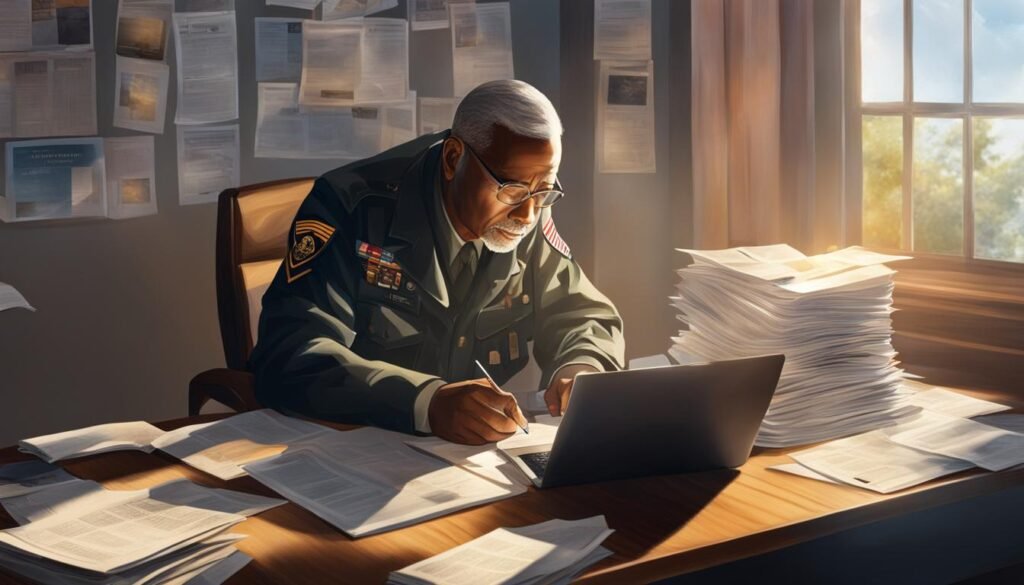
Your time in the service has provided you with a unique skill set and experiences. Now, as you transition to civilian life, setting educational goals for veterans becomes a pivotal step in building a future that resonates with your aspirations. This starts with aligning your military experiences with academic goals and selecting a veteran-friendly institution that can pave the way for your next mission.
Evaluating Programs Aligned with Your Aspirations
Just as strategic planning is essential in the military, now is the time to plan your academic and career trajectory. Consider the fields that spark your interest and the industries that are growing. Institutions like Franklin University have honed their offerings to include technology, cybersecurity, and business programs that not only match market demands but also present attractive career advancement opportunities for veterans like you.
- Explore programs that offer a springboard from your military experience into the corporate sector or specialized fields.
- Choose colleges that cater not just to traditional students but understand the unique perspective of veterans.
- Seek out military-friendly online college options that provide the flexibility you require for balancing work, family, and studies.
The Impact of Military Experience on Academic Pursuits
Your military service is a badge of honor and a repository of invaluable skills. Forward-thinking colleges recognize this and may award academic credit for military training. These credits can fast-track your education, making the impact of veteran services on college success a beneficial factor in your academic journey.
“Your service has equipped you with a unique set of skills. Ensure the college you choose values your military experience and reflects it in the credits awarded.”
By selecting an institution that honors your military background, you set the stage for leveraging your skills into academic success. This affirmation of your journey is a testament to their commitment to veteran education.
In the quest for the perfect college or university, weigh the following aspects:
| Consideration | Detail | Impact on Veterans |
|---|---|---|
| Career-relevant programs | Programs in sync with today’s job market and tech advancements. | Enhances employability in competitive industries. |
| Recognition of military experience | Colleges that offer credit for your service-related skills and knowledge. | Shortens the academic journey and respects the value of service. |
| Flexible learning options | Online courses, accelerated tracks, and convenient scheduling. | Allows continuation of education without compromising personal responsibilities. |
In summary, when selecting a veteran-friendly institution, look for one that not only provides the right programs but also respects and rewards your military background, offering the flexibility and support needed to excel academically while balancing your civilian life.
Identifying Military-Friendly Colleges and Universities
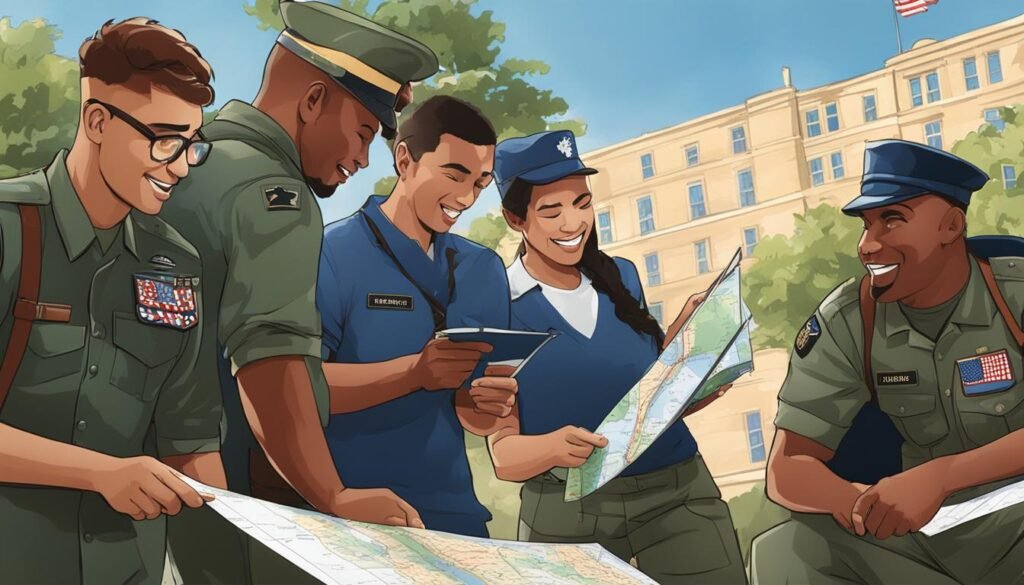
As you transition from military life to civilian ambitions, it’s crucial to pinpoint a college that aligns with your unique background and goals. When figuring out how to find military-friendly colleges near you, you’ll require a strategic approach. Not all institutions are created equal in their support for our nation’s service members and veterans. Therefore, crafting a military-friendly colleges list demands careful research and a keen understanding of your own educational needs.
Seeking out an institution that prioritize the success and support of veterans implies looking beyond the surface level designation of ‘military-friendly’. Ascertain the concrete actions that schools are taking to accommodate military personnel. Here are decisive factors to guide your search:
- Verify the school’s accreditation status to ensure your degree will be respected and valuable.
- Investigate whether institutions allow for transfer credits for military experience, capitalizing on your service training.
- Check for dedicated support services specialized for veterans and their unique circumstancial needs.
- Explore if the college has a history of supporting military students through graduation and into successful careers.
Accreditation is not only about the institution’s credibility but also about the transferability of your credits should you decide to further your education. Equally, the range and depth of veteran support services reveal how institutions integrate empathy with practical assistance. These services foster a supportive academic environment.
A detailed examination of policies such as the transfer of credits can also signal a college’s understanding of the value your military experience brings to their campus. Institutions that award credit for military training not only honor your past efforts but also enhance your academic journey, saving you both time and money.
| Criteria | What To Look For |
|---|---|
| Accreditation | Affirmation from recognized accrediting organizations |
| Support Services | Counseling, advising, career services, and veterans’ organizations |
| Transfer Credits | Policies that recognize and award credit for military experience |
| Student Success Rates | Graduation data specific to veterans and their post-graduation employment |
Take the time to connect with veterans currently enrolled at the institutions you are considering. Their insights can illuminate how well the school accommodates veteran needs and the overall culture toward military experience.
When you encounter a college that actively seeks to understand and build upon your military skills, you’ve likely found a place where you can thrive academically and professionally.
In your mission to identify the right military-friendly college, create a well-researched list that gauges each school’s dedication to your success. This critical analysis will assure you invest your time and benefits in a college contributing to your continued growth as a civilian.
Criteria for Evaluating Military-Friendly Colleges
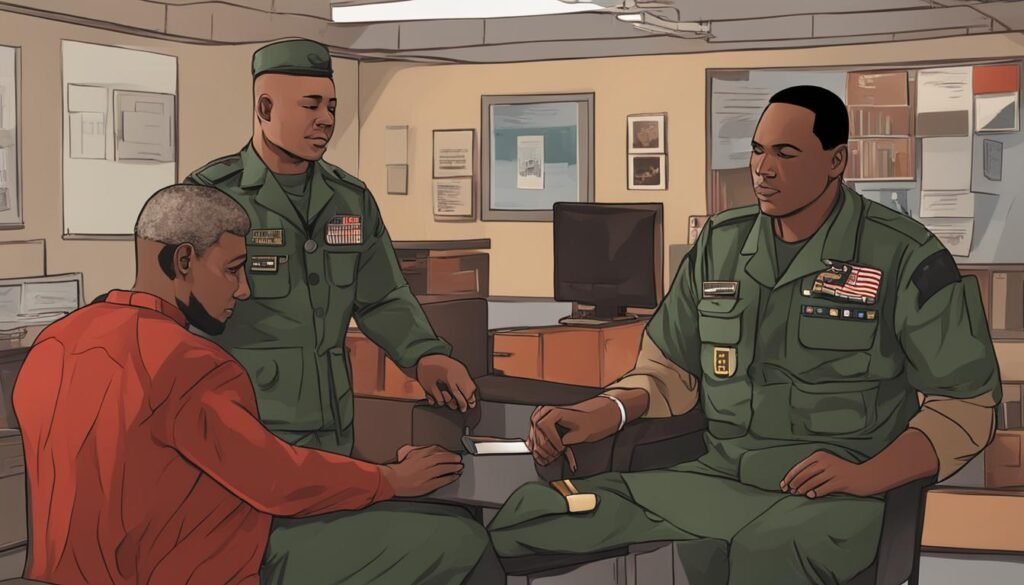
When you consider advancing your education post-service, it is essential to dive into the specifics of evaluating mental health support for veterans in colleges as well as assessing the overall military-friendliness of the institution. The criteria detailed below will help you determine if a college meets the standards imperative for a supportive and fruitful academic experience for veterans.
Accreditation and Academic Reputation
One of the foundational elements to consider is the accreditation of military-friendly colleges. This factor reflects the quality and credibility of the education you will receive. Accredited institutions have undergone rigorous reviews to ensure they meet high academic standards, which in turn, facilitates your transition into the workforce with a degree that employers value and respect.
“Choosing an accredited institution is non-negotiable if you want your credentials to carry weight in the competitive job market.”
It’s not just about meeting the standard, however. You should also take into consideration the college’s reputation within the veteran community and industry sectors relevant to your career interests.
The Importance of Veteran Support Services
Institutions differ in how they support their veteran population, so it is critical to compare how colleges create inclusive environments tailored to the unique needs of service members. Look for schools that provide a robust suite of services, such as career counseling, academic advising, and networking opportunities that understand the military-to-civilian transition.
| Veteran Support Service | Offered Services | Benefits |
|---|---|---|
| Career Resources | Job placement, interview preparation | Ensures competitive entry into the workforce |
| Transfer Credit Policy | Evaluation of military training for academic credit | Reduces time and cost to degree completion |
| Educational Benefits Expertise | Understanding of GI Bill and other benefits | Maximizes your entitled financial aid |
Accessibility and Accommodation for Veterans
The commitment of a college to facilitate accessibility services for disabled veteran students speaks volumes about its military-friendliness. Accommodations extend beyond physical accessibility; it encompasses academic flexibility and resources that acknowledge and cater to the varied experiences and potential disabilities of veteran students. Research whether schools offer adaptive learning tools, PTSD support groups, and other services that honor your service and sacrifice.
- Flexible scheduling for those balancing education with work or family
- Physical accessibility for disabled veterans
- Programs addressing the mental health needs of veterans
Selecting a military-friendly college requires a comprehensive approach to ensure your unique needs are addressed. A college that excels in offering accredited and reputable programs, comprehensive support services, and appropriate accommodations will be instrumental on your journey to academic and career success post-service.
Assessing the Financial Aid Options for Veterans
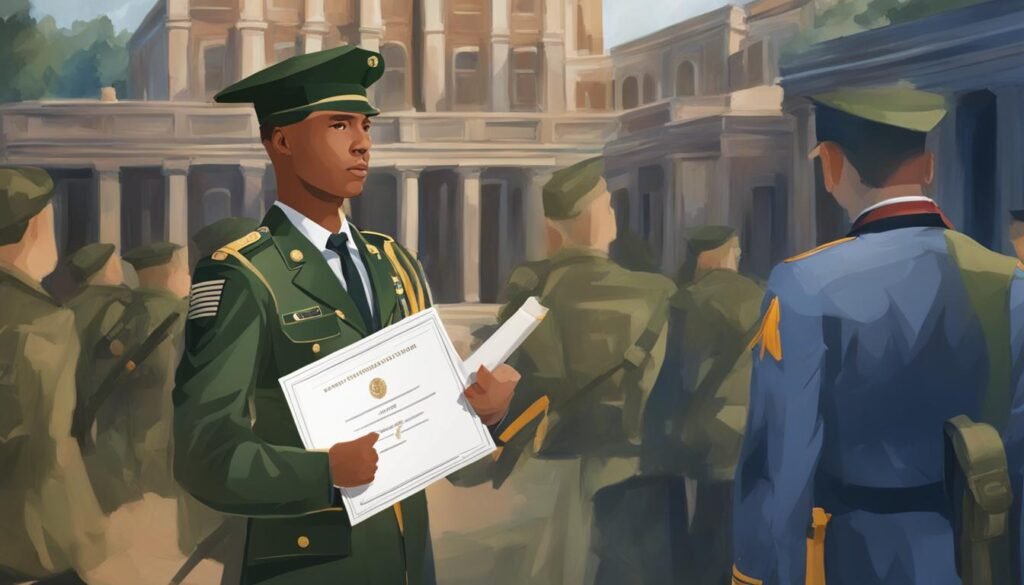
Transitioning from military to civilian life involves significant changes, and one crucial aspect to navigate is the landscape of financial aid options at military-friendly colleges. Understanding these options, including eligibility for various programs, is key to embracing the educational opportunities ahead of you.
As a veteran, you are likely familiar with the GI Bill, which offers a substantial amount of support for your educational ventures. However, the financial aid landscape extends far beyond the GI Bill alone. Let’s explore the range of financial aid options designed to ease the financial burden and open doors to advanced learning.
| Financial Aid Option | Description | Benefit to Veterans |
|---|---|---|
| Post-9/11 GI Bill | Covers tuition, housing, and book stipends for up to 36 months of college education. | Provides comprehensive coverage for many education-related expenses. |
| Yellow Ribbon Program | Assists with tuition costs that exceed the GI Bill cap, especially for private or out-of-state schools. | Expands educational options without incurring additional debt. |
| Scholarships for Veterans | Specific scholarships tailored to veterans, often based on service history or chosen field of study. | Offers additional funding that does not need to be repaid. |
| State Veterans Education Benefits | Various states offer additional benefits such as tuition waivers or reductions. | Provides extra financial aid based on your state of residence. |
| Military Spouse and Dependent Programs | Programs like MyCAA offer financial assistance for military spouses pursuing portable careers. | Supports the educational advancement of military families. |
To maximize the financial aid options at military-friendly colleges, it’s imperative that you take a personalized approach. Each veteran’s situation is different, and as such, you should consider your own objectives, whether it’s a bachelor’s degree, graduate studies, or trade certifications.
Let’s not forget about the military spouse and dependent programs, which provide a web of support for the loved ones of those who have served. These programs acknowledge their sacrifices and contribute to the strength of military families through educational empowerment.
“The pursuit of higher education should not be a financial burden for those who have served. Military-friendly colleges are deeply committed to providing the support necessary to ensure that veterans, as well as their spouses and dependents, have ample resources to reach their academic goals without undue financial stress.”
Investigate each financial aid option thoroughly and consult with the college’s veterans’ support services. They can offer personalized advice and help you navigate the necessary applications to ensure you take full advantage of the resources available to you.
Remember, part of setting yourself up for success in your post-military academic endeavors is grounding yourself in the knowledge of what financial aid can do for you. By evaluating this component carefully, you’re charting a course for a stress-reduced educational path, making it easier to focus on what truly matters—your academic and career growth.
- Review the eligibility requirements for the GI Bill and Yellow Ribbon Program
- Seek out scholarships tailored to veterans and their specific circumstances
- Explore state-specific education benefits that may provide additional financial assistance
- Remember to include financial aid options that cater to military spouses and dependents in your research
Ultimately, investing time to assess and understand these financial aid options will equip you with the knowledge to make informed decisions, enabling you to thoroughly capitalize on the benefits you’ve earned. Start your journey by ensuring financial readiness, paving the way for a smooth and successful academic experience.
The Significance of Career-Ready Majors and Programs
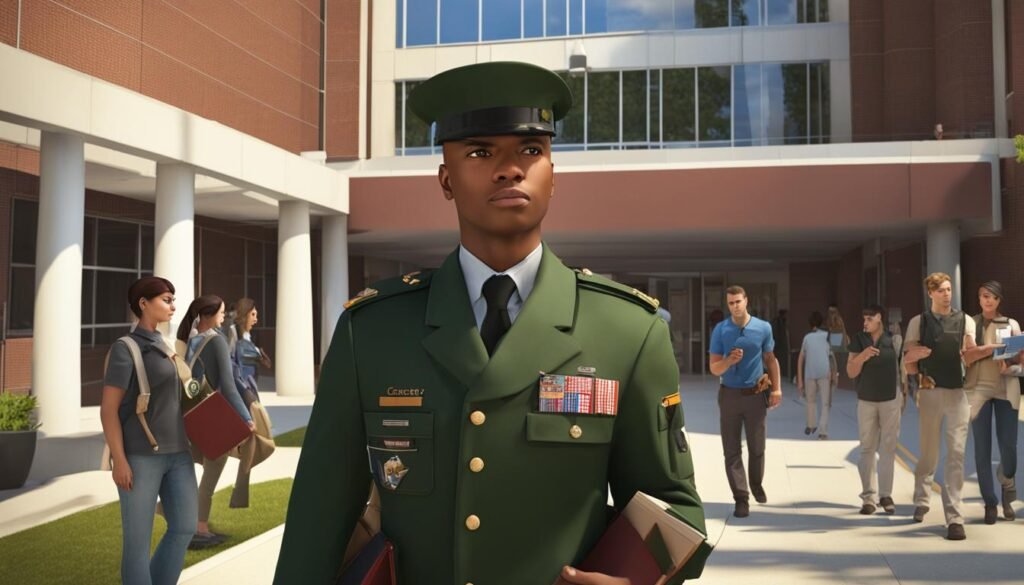
In your quest to become a civilian professional post-military, understanding the pivotal role of career-ready majors and programs is a must. These fields of study are meticulously designed to align with the latest labor market trends, ensuring that the knowledge and skills you acquire are both current and in demand by employers. This educational focus is particularly crucial for you, as a veteran, to adapt to the civilian workforce seamlessly while leveraging the experience gained from your service.
Evaluating the quality and relevance of career services for veterans in colleges is equally important. It’s not only about getting a degree; it’s about transitioning into a fulfilling career. Career services play an integral role in this transition by offering personalized guidance, resume workshops, and helping you to connect with veteran-friendly employers who value and seek your unique skills set.
Consider the following table which showcases career-ready majors and their alignment with market demand:
| Career-Ready Major | Market Demand | Skills Acquired | Future Outlook |
|---|---|---|---|
| Information Security | High | Cybersecurity, Network Defense | Expected growth of 28% by 2026 |
| Business Administration | Stable | Management, Strategic Planning | Diverse roles across sectors |
| Healthcare Management | Increasing | Healthcare Policy, Administration | Significant growth due to demographic trends |
When you explore educational pathways, pay close attention to how these majors can provide a direct conduit into industries where you can not only apply your military background but also grow in a new career path.
Choosing a major should not be taken lightly; it is the cornerstone upon which your future career is built. Opting for career-ready programs ensures you’re equipped for tomorrow’s job market.
By prioritizing career readiness in your educational pursuit, you make a well-grounded investment in your professional future. This ensures your transition is smooth and success-driven.
- Review college catalogs and websites for majors and programs with high employment rates and strong industry partnerships.
- Assess the quality and accessibility of career services available to veterans on campus.
- Pay special attention to colleges that have a track record of graduate employment in your field of interest.
Your academic endeavors should reflect your ambition to excel in the civilian workforce. As such, aligning your military discipline, leadership, and specialized training with a vibrant, market-relevant field of study is paramount for success. In the process of evaluating potential colleges, consider how well they grasp the necessity for career-ready programs and solid veteran career services. This strategic consideration will place you at the helm of your professional journey, where your military past and civilian future converge synergistically.
Analyzing Flexibility and Convenience in Program Offerings

When taking the next step in your educational journey, analyzing program flexibility for veterans is critical. This analysis ensures that the institution you choose fully supports your unique needs as someone who has served. Military-friendly institutions with strong community ties understand the dynamic nature of veterans’ lives and thus offer a variety of flexible learning arrangements.
Options for Online Learning and Campus Proximity
The advent of military-friendly online college options has opened doors for veterans looking to integrate education with other life responsibilities. These online programs afford you the ability to learn from anywhere, be it from the comfort of your home or a café in your neighborhood. Proximity to campuses can also influence your academic routine, with local or satellite campuses providing convenient access for in-person learning experiences or administrative needs.
| Learning Option | Flexibility Benefits | Why It Matters for Veterans |
|---|---|---|
| 100% Online Programs | Study from any location, flexible access to course materials | Allows for educational pursuits alongside continued service or other commitments |
| Hybrid Programs | Combination of online and on-campus courses | Provides a balance of traditional classroom interaction and online convenience |
| Satellite Campuses | Closer to home, community integration | Reduces commute, ties educational experiences with local veteran community |
Understanding the Class Scheduling and Accelerated Programs
For veterans, flexible class scheduling for veterans is a key consideration in your search. Colleges that offer evening and weekend classes demonstrate an appreciation for the time constraints often faced by students who may be juggling multiple responsibilities. Accelerated programs at veteran-friendly colleges stand out as an exemplary way to consolidate courses into shorter time frames, propelling you toward graduation more swiftly and efficiently.
“The flexible class schedule and the choice of accelerated programs at Franklin University allowed me to progress through my cybersecurity degree while maintaining my responsibilities to my family and my work.”
| Program Structure | Description | Advantages for Veterans |
|---|---|---|
| Evening Classes | Classes scheduled for evenings, typically once a week | Enables daily work or childcare activities to be maintained |
| Weekend Classes | Courses offered on Saturdays and/or Sundays | Provides additional scheduling flexibility for those with weekday commitments |
| Accelerated Programs | Condensed courses designed for faster completion | Reduces time to a degree, delivering educational benefits in a timelier manner |
When exploring online colleges for active-duty military members or veterans, it is important to prioritize program flexibility. Such accommodations in learning modalities, course schedules, and program pacing are integral to your academic success and overall satisfaction with your college experience.
- Consider colleges that offer comprehensive online learning systems and accessible support services.
- Assess the availability of nighttime and weekend classes that sync with your life’s demands.
- Explore accelerated programs which can help you achieve your educational goals without prolonged timelines.
Ultimately, the goal is to find a college that not only respects but actively supports your dedication to service, family, and personal growth through flexible and convenient program offerings.
Availability of Veteran Academic and Peer Support Services
Transitioning from military service to the academic environment can be a challenging yet rewarding journey. Key to this transition is the availability and quality of veteran academic advising programs in colleges. These programs provide essential guidance and support, offering you a pathway to make the most of your higher education experience.
“The support and advice from a dedicated veteran academic advisor have been instrumental in my success as a student. Their understanding of my experiences as a veteran has made all the difference.” – A testament to the value of veteran-specific academic advising.
Veteran transition programs offered by colleges are another crucial element of support services. They provide you comprehensive roadmaps for integrating your valuable military skills into your new academic career.
Mentorship and Academic Advising Programs
Many colleges have recognized the need for specialized support and have responded by creating veteran peer mentoring programs in college. These programs connect you with fellow veterans who can share their experiences and strategies for success.
These programs often extend beyond casual advice, evolving into lasting mentorship relationships that foster both professional and personal growth. Strong networking opportunities through college veteran services can also significantly improve career prospects post-graduation.
| Program Type | Services Offered | Benefits to You |
|---|---|---|
| Academic Advising | Course selection, educational planning, understanding academic policies | Ensures your course of study aligns with your career and personal goals |
| Peer Mentoring | One-on-one support, shared experiences, study groups | Builds community and provides insights from a veteran’s perspective |
| Networking Events | Connections with industry professionals and other veterans | Opens doors to potential job opportunities and professional mentorship |
| Transition Workshops | Resume building, interview skills, civilian workplace navigation | Fosters successful transition into the civilian workforce |
In your search for the right college, prioritize institutions that value the contributions of veterans. Look for colleges where these programs aren’t just an afterthought but are a pivotal part of the institution’s mission to serve you and your peers effectively. To achieve your full potential in college, ensure that a structure is in place to support you every step of the way.
- Seek out colleges that provide personalized veteran academic advising programs to guide you through your academic journey.
- Consider the strength and availability of veteran peer mentoring programs which can offer insights into campus life and study tactics.
- Explore the networking opportunities available through college veteran services, enhancing your post-graduation career prospects.
- Assess the robustness of veteran transition programs offered by colleges to facilitate a smooth insertion into the workforce.
Academic success as a veteran doesn’t have to be a solitary pursuit. With the right support systems in place provided by your chosen institution, you can look forward to a meaningful and successful college experience that recognizes and builds upon your distinguished service.
Exploring Campus Culture and Social Integration for Veterans

Entering college as a veteran often entails more than just academics—it’s about exploring campus culture for veterans and discovering how you’ll fit into a new social setting. Vital to your college selection is identifying and engaging with social integration programs for veterans in college. These programs can immensely enhance your college experience, helping in your transition from a military to a civilian learning environment.
To ensure that you’re choosing an institution that values and facilitates veteran integration, consider the breadth and depth of social programs available. Does the college have active veteran clubs or associations? What kind of regular events or gatherings are there for veterans? These questions can give you insights into the campus culture surrounding veterans.
Connecting with fellow veterans and the larger campus community can greatly impact your overall college experience, leading to increased satisfaction and success.
Here, we’ll delve into what makes a veteran-friendly campus culture and how different colleges foster a sense of community among their veterans and non-veteran peers alike.
Creating a vibrant, inclusive campus culture requires more than mere gestures; it needs actionable programs and support systems in place:
- Look for colleges that not only host veteran-specific events but also ensure their integration into wider campus activities.
- Don’t hesitate to reach out to the student veterans’ association or similar groups, as they can offer a sense of community and camaraderie.
- Consider if the college’s social events are structured to allow veterans to share their unique experiences and perspectives with non-veteran students and faculty.
Furthermore, the types of social integration programs vary, from mentorship and networking opportunities to community service projects and social gatherings. Here’s a table overview of typical programs with their potential benefits:
| Social Integration Program | Benefits to Veterans |
|---|---|
| Orientation Sessions Specifically for Veterans | Helps veterans navigate college processes and resources comfortably. |
| Veteran Student Associations and Clubs | Offers a sense of belonging and peer support within the campus community. |
| Mentoring Programs | Facilitates valuable connections with established veteran students or alumni. |
| Cultural and Social Events | Encourages veteran engagement with the broader college community. |
| Community Service Projects | Empowers veterans to take on leadership roles and give back, enhancing campus integration. |
Whether the college has a large veteran population or a smaller, close-knit group, these programs can serve as the heart of political activism, social interaction, and mutual support. They’re a testament to the college’s commitment to
exploring campus culture for veterans.
As a veteran, your journey doesn’t end with the selection of a veteran-friendly program or institution. It’s also about ensuring the campus you choose will support your continued growth socially and academically. When veterans and non-veteran students come together in these vibrant campus cultures, the exchange of perspectives enriches the college experience for all.
In closing, when you’re evaluating potential colleges, look beyond the statistics and brochures. Instead, identify those institutions that have dedicated time and resources to build a thriving community culture — an environment where veterans are not only welcome but embraced.
Investigating the Success Rate of Veteran Graduates

If you’re a military veteran considering higher education, the success rates of military personnel in top colleges is a crucial statistic to review. It speaks volumes about how well an institution not only accommodates veterans but also prepares them for life after graduation. Exploring this success rate can give you a realistic expectation of what awaits upon degree completion. To further aid your research, testimonials from military students at top colleges can provide you with genuine insights into other veterans’ experiences and the educational paths they pursued.
“Attending a top college as a military veteran transformed my career prospects. The tailored support and recognition of my military skills were pivotal.” – A sentiment echoed in testimonials from veteran graduates.
Let’s delve into the data that can help you gauge the effectiveness of a college’s programs for military personnel:
| Success Indicator | Details | Importance to You |
|---|---|---|
| Graduation rates of veterans | Proportion of veterans who complete their degrees within an institution | Reflects the college’s capacity to help veterans finish their educational goals |
| Employment rates post-graduation | Percentage of veteran graduates employed in their field of study after leaving college | Indicates the college’s effectiveness in preparing veterans for the workforce |
| Alumni satisfaction levels | Measurement of veteran graduates’ contentment with their college experience and education | Offers insight into how valued and supported veterans feel during and after their studies |
| Career progression of graduates | Advancements and achievements in the careers of veteran alumni | Demonstrates the long-term impact of the college’s education on veterans’ careers |
It’s essential to note how testimonials and real stories from veteran alumni can sometimes reveal more than statistics can illustrate. These experiences uncover the qualitative aspects—like mentorship quality, transition services, and campus community support—that can significantly influence your educational journey and career progression. Such testimonials from military students at top colleges can offer vital, candid perspectives on the tangible and intangible returns of your potential college investment.
- Search for colleges with high employment rates among veterans, indicating robust career support systems.
- Read through testimonials for personal accounts of post-graduation success and satisfaction.
- Consider colleges that show strong alumni networks, which can be vital for career advancement.
The journey from military service to academic achievement should be one that elevates your professional standing and utilizes the skills honed during your service.
Conducting thorough analysis of the success rates of military personnel in top colleges and seeking out honest and diverse testimonials from military students are integral to making an informed decision. This effort will navigate you towards an institution with a proven track record of empowering veteran students to reach and maximize their academic and career potential.
Final Thoughts
In the journey of selecting a veteran-friendly college based on academic programs, it’s clear that your military experience and career aspirations should lead the way. It’s about finding a harmonious blend of post-service goals with the robust offerings of a college that respects and supports your transition back into civilian life. As you sift through your options, keep in mind the institutions that extend beyond textbook learning to offer real-world applicability, ensuring that your education is not only enriching but also practical.
Moreover, the role of campus culture in selecting a veteran-friendly college cannot be underestimated. A supportive and inclusive environment contributes significantly to your educational success and overall well-being. The camaraderie found in veteran programs and clubs, the welcoming atmosphere on campus, and the shared experiences with peers serve as a backbone for your academic journey. Consider these cultural dimensions as they are pivotal in shaping your experience and facilitating a seamless integration into college life.
Ultimately, deliberate over each aspect of a college’s offerings—from their recognition of your military training to financial aid options tailored for veterans, from the flexibility of program schedules to comprehensive academic and peer support. Your informed choice will not only honor the dedication and sacrifices you’ve made but will also secure a fulfilling future that leverages the skills and discipline you bring to the table.
How to Choose a Military-Friendly College for Veterans – Frequently Asked Questions (FAQs)
What are the best colleges for veterans?
When looking for the best colleges for veterans, it is important to find schools that offer benefits, programs, and resources specifically for military students. Some of the top colleges for veterans provide services like dedicated veterans centers, academic credit for military training, veteran student organizations, and participation in the Yellow Ribbon program. Highly ranked schools like Cornell, Princeton, Villanova, and UCLA are considered among the best for veterans support.
How do I choose a college for the military?
Choosing a military-friendly college involves researching schools that offer benefits like credit for military training, discounted tuition rates, flexible enrollment options, veterans support services, and access to GI Bill funding. Consider your career goals, desired degree program, and whether you prefer online or in-person classes. Compare schools based on cost, location, academic quality, and veterans resources to find the best fit.
What makes a college veteran friendly?
Colleges considered veteran-friendly have resources dedicated specifically for military students like veterans centers, counselors, student groups, and advisors. They offer benefits such as credit for military training, Yellow Ribbon funding, discounted tuition, flexible enrollment, veterans orientation programs, and access to GI Bill funding. Military-friendly schools create a supportive environment for veterans transitioning to college.
Do veterans have a better chance of getting into college?
Veterans may have an advantage in college admissions depending on the school. Some colleges consider military service and offer application fee waivers for veterans. Leadership skills gained in the military can strengthen college applications. However, academic factors like test scores, grades, and coursework are still important. Veterans should focus on presenting their qualifications and highlight how military experience has prepared them for college.
Can veterans go to Yale for free?
Yale offers free tuition for certain veterans through its Eli Whitney Students Program, which is designed for nontraditional students such as veterans. Applicants must be admitted to Yale and qualify for GI Bill benefits to receive free tuition and fees. Room, board, and book costs are not covered. Yale also participates in the Yellow Ribbon Program to help reduce costs.
What state is the most military-friendly?
Florida, Texas, Virginia, South Carolina, and Georgia are considered among the most military-friendly states, according to rankings from WalletHub and Military Times. These states offer benefits such as tax advantages, education assistance, employment programs, retirement options, and quality VA health services for veterans and active-duty military personnel.

